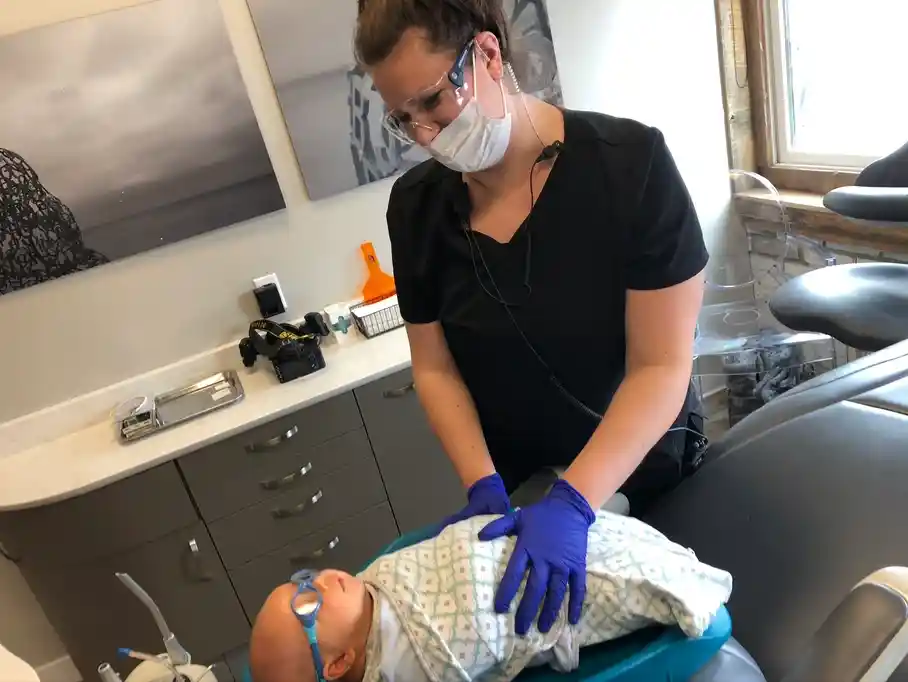Are you or your child experiencing difficulty with swallowing, speech, or breathing? Have you heard of, but are still wondering – what are tongue-ties? Tongue-ties can be a common issue, but it’s essential to understand what they are, how they occur, and what can be done about them. Therefore, in this article, we will cover everything you need to know about them, so you can make informed decisions about your oral health.
Signs and Symptoms of a Tongue-Tie
A tongue-tie, also known as ankyloglossia, is a condition that occurs when the thin piece of tissue that connects the tongue to the bottom of the mouth is too short, thick, or tight. This condition can cause various symptoms, including:
- Difficulty sticking out the tongue
- Trouble breastfeeding or bottle-feeding
- Inability to lift the tongue to the roof of the mouth
- Speech difficulties, particularly with certain sounds like “t,” “d,” “l,” and “n.”
- Mouth breathing
- Clicking or popping sounds while breastfeeding
If you or your child is experiencing any of these symptoms, it’s essential to get an evaluation from a qualified professional.
What Causes a Tongue-Tie?
The cause of a tongue-tie is not always clear. Occassionally, it is a genetic condition that is present at birth, while in other cases, it may be due to environmental factors. According to research, a tongue-tie may be caused by an imbalance in the genes that control the formation of the tongue.
How Young Can a Tongue-Tie Be Diagnosed?
Pediatricians and lactation consultants can also assess them in babies experiencing difficulty breastfeeding or bottle-feeding. However, if you experience difficulties in feeding your baby despite being told that there is no tongue-tie, you should consider consulting with a doctor of the mouth who specializes in this area. Additionally, a qualified oral healthcare provider, such as a dentist, orthodontist, or oral surgeon, can evaluate older children and adults for tongue-ties.
Who Can Diagnose a Tongue-Tie?
A qualified oral healthcare provider can diagnose it through a visual and functional examination. They may also use a tool called a frenulum gauge to measure the frenulum’s length and determine if a tongue-tie is present Your provider should be checking for other compensations in your muscles or floor of mouth as well. When looking for a tongue tie, they should always check for adequate tongue space and tongue strength. If necessary, they may refer you to a specialist such as a myofunctional therapist or orthodontist for further evaluation or treatment if tongue space or tongue tone is not adequate.
What Happens if a Tongue-Tie Goes Untreated?
If left untreated, a tongue-tie can cause a variety of issues. These issues include speech problems, difficulty with breastfeeding or bottle-feeding, and dental issues such as gum recession, tooth decay, and malocclusion. Additionally, it can also lead to a higher risk of sleep-disordered breathing, such as snoring or sleep apnea. We care about jaw growth and recognize that untreated, these can cause problems with many things.
Treatments, Procedures & Recovery
A simple procedure called a frenectomy can treat tongue-ties, which involves cutting or releasing the frenulum using a laser, scissors, or a scalpel.The procedure is quick and typically performed in-office with local anesthesia.
After the frenectomy, patients may experience some mild discomfort, swelling, and bleeding, but these symptoms typically resolve within a few days. It’s essential to follow post-operative instructions carefully to ensure proper healing.
Tongues Aren’t Scary!
Tongue-ties can be a frustrating and challenging condition, but they don’t have to be! Maintain optimal oral health by understanding what they are, how they occur, and how they can be treated. .If you or your child is experiencing symptoms of a tongue-tie, don’t hesitate to schedule a consultation with a qualified oral healthcare provider. They can provide a thorough evaluation and discuss potential treatment options, such as a frenectomy, and answer any questions or concerns you may have.
If you’d like to learn more about dealing with tongue-ties, or think you or your child may have a tongue restriction, schedule a virtual consultation with Dr. Turner today. We’ll get to know you and evaluate your family’s unique needs. We have a team of experienced dental professionals who specialize in identifying and treating tongue-ties in patients of all ages.
Schedule a Consultation
If you’re experiencing symptoms of a tongue-tie, we encourage you to schedule a consultation with us. Our team will work with you to develop a personalized treatment plan that addresses your specific needs and concerns. Our commitment is to help you achieve optimal oral health and overall well-being.
In conclusion, tongue-ties can be a challenging condition, but they are treatable. It’s essential to recognize the signs and symptoms and seek treatment from a qualified oral healthcare provider. Don’t let a tongue-tie interfere with your quality of life. Schedule a consultation with us today, and let us help you achieve optimal oral health.






